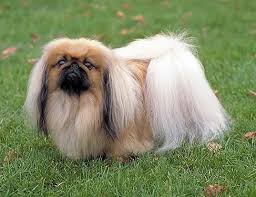
Pekingese
Conditions of detention
Pekingese are well-suited to indoor living and can thrive in apartments or houses. They do not require large spaces but enjoy having a comfortable and secure environment.
Useful Fact: Due to their small size and brachycephalic (flat-faced) structure, Pekingese do not tolerate extreme temperatures well and should be kept in a climate-controlled environment.
Nutrition and diet
A balanced diet rich in high-quality protein and essential nutrients is crucial for Pekingese to maintain their health and energy levels. High-quality commercial dog food or a well-planned homemade diet can meet their nutritional needs.
Useful Fact: Portion control is important to prevent obesity, as Pekingese can easily gain weight if overfed.
Health
Pekingese are generally healthy but can be prone to certain genetic health issues such as brachycephalic airway syndrome, patellar luxation, heart problems, and eye conditions. Regular veterinary check-ups are essential.
Useful Fact: Their lifespan is typically around 12 to 15 years with proper care and regular veterinary visits.
Grooming and care
Pekingese have a long, luxurious double coat that requires regular grooming to prevent matting and tangling. Daily brushing and occasional baths are necessary to keep their coat in good condition.
Useful Fact: Their facial wrinkles should be cleaned regularly to prevent infections and skin issues.
Education and training
Pekingese are intelligent but can be independent and stubborn, which can make training a challenge. Consistent, positive reinforcement methods work best.
Useful Fact: Early socialization and training are crucial to ensure they are well-behaved and adapt well to various social situations.
Toys and entertainment
These dogs enjoy toys that engage their minds and provide entertainment. Interactive toys, gentle chew toys, and puzzle games are excellent choices.
Useful Fact: Regular mental and physical stimulation through play helps keep them happy and prevent boredom-related behaviors.
Safety
Given their small size and delicate structure, Pekingese should be handled with care. Supervision is necessary to prevent injuries during play or interactions with larger pets.
Useful Fact: They should not be overexerted, especially in hot or humid weather, due to their brachycephalic nature.
Accessories
Essential accessories for Pekingese include soft collars, leashes, and harnesses. Comfortable bedding and appropriately sized crates for rest and travel are also necessary.
Useful Fact: Using a harness instead of a collar for walks can help prevent neck injuries due to their delicate tracheas.
Socialization
Early and ongoing socialization with people, other dogs, and various environments is crucial for Pekingese to develop into well-rounded adults.
Useful Fact: Proper socialization helps them adapt to new situations and reduces potential anxiety or fear-based behaviors.
Travel and Transportation
Pekingese are adaptable travelers and can handle car rides well if accustomed to them from a young age. Ensure they are securely restrained during travel.
Useful Fact: Portable water bowls and comfortable travel crates can make journeys more manageable for them, especially on long trips.
Behavior and psychology
Pekingese are known for their intelligence, loyalty, and regal demeanor. They form strong bonds with their owners and enjoy being the center of attention.
Useful Fact: Regular interaction and engagement with their human families help prevent separation anxiety and promote a well-balanced temperament.
Legal aspects
Owners should be aware of local leash laws and regulations regarding pet ownership. It’s also important to ensure they are up-to-date with vaccinations and licenses.
Useful Fact: Microchipping can help recover a lost dog more quickly and is often required by local regulations.


